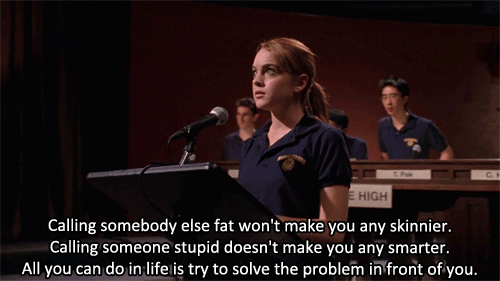Every person in our generation has (hopefully) seen "Mean Girls," the ultimate “high school drama” that follows three Plastics and the new girl, Caty (“It’s pronounced Katie”). The passing of the date when hunk Aaron Samuels asks Caty the date, October 3rd, is a surefire way for this movie to re-emerge every year in its full glory.
I love "Mean Girls" – it never seems to get old no matter how many times I watch it – and I think others my age, girls and guys, would say the same. However, there was a scene this year that hit me harder than usual, given the general state of our country.
I know, comparing a chick flick to the chaos that is American politics is a bit obnoxious, but bear with me.
In her effort to become an insider to the Plastics, Caty begins to see that she is slowly becoming one: she becomes obsessed with her looks, begins to disassociate with her close friends, makes bad decisions, and judges anyone who is not in the Plastic clique.
By the end, as we all know, Caty becomes the chosen candidate for the final question at the Mathletes competition, going head-to-head with the only girl on the other team. In that moment, Caty immediately judges her opponent by her hair, makeup, and outfit choice.
Halfway through the problem, though, Caty realizes a heavily deep-rooted issue regarding judgement.
I think this is the most underrated quote throughout the entire movie, right after “I’m getting cheese fries,” because duh.
But Caty brings up an extremely relevant point: why do we waste so much time judging others, when obviously it calls for no action?
This is not limited to small scale cat-fights either; we can skim through today’s political debates and find the same judgmental attitude amongst those who are leaders of this country. We see it in debates on social movements, celebrity interviews, our own friends in the cafeteria. It is something so imbedded in our lives that it can be hard to realize just how present it really is. We do it without second guessing ourselves, as if we have an assumed notion that everybody else’s lives are automatically our business.
Appraising others without their permission is a breach of privacy, planting yourself into a life that does not need your opinion to survive.
Yes, Caty is a fictional character; if the movie were a reality, it would probably take her years (instead of mere seconds mid-math problem) to make this realization. But for the sake of relatability, we can actually extract a relevant lesson from Tina Fey’s masterpiece.
Judging others does not create change; it only creates hate, distrust, sadness.
Judging is wasted energy—energy that can be used on problems much bigger than attire choices or personal interests. You have unlimited capability to make positive change.
It is not hard to think before we speak, this is what we have been taught to do since childhood. So listen to your elementary school teacher: think about if what you are about to say will actually amount to anything other than the destruction of another person, or the elevation of yourself. Think about the type of reaction your words would receive: would it be hurtful, or inspirational?
With our county in this monumental transition, words are powerful: don’t waste them on declarations that will set us back instead of forward.























